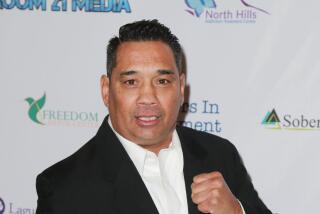United Airlines Workers Seek Answers on Pensions
- Share via
Just before Christmas, retired United Airlines worker Jerry Formulak saw his pension check shrink by $500 a month. On Tuesday, he had a chance to ask how it could happen.
“At one point, they [United] were spending money hand over fist,” he said. “How could they get away with not putting enough money in the pension?”
The question was largely rhetorical. Formulak, 63, of Chino, was among about 200 current and former United Airlines ground crew workers and flight attendants who attended a meeting called by the Pension Benefit Guaranty Corp. to explain the new realities of their retirement plan.
The federal agency took over United’s pension program nearly one year ago after the struggling airline convinced a Bankruptcy Court that it could no longer meet its obligations. Since then, thousands of United workers and retirees have been notified that their retirement payments have been cut, and that they are no longer able to earn future pension benefits.
The government-chartered pension agency has been holding meetings around the country with United workers -- many of whom will not get the payments they were once promised because of restrictions imposed by pension insurance laws.
At Tuesday’s meeting, held at a hotel near Los Angeles International Airport, agency officials said it would take about three years to figure out just how much each worker should receive.
Many of those attending the meeting had questions about the complex formulas that will determine how much they will get. A few, like Formulak, complained about United management to the board, while others spoke bitterly in interviews about their situation.
“United sold us out,” said Jan Heistermann, a retired flight attendant from Orange County, noting that union contracts sacrificed pay raises in hopes of retaining pension benefits.
“The young flight attendants are going to be the ones really taking a hit,” she added. “They’re not going to get anything.”
Alternately hugging and commiserating with other flight attendants, Barbara Brockie-Smaldino said it wouldn’t be so bad to lose benefits if the loss was shared by everyone. Instead, she noted, it was recently announced that hundreds of United executives would receive bonuses for having successfully steered the company out of bankruptcy protection.
“We took pay cuts,” said Brockie-Smaldino. “They took no cuts. They were rewarded for sticking it to everyone else.”
United issued stock to employees, including top-ranking officers, when it emerged from bankruptcy protection two weeks ago, said United spokeswoman Jean Medina. The intent of the stock grants was to align management interests with those of stockholders, she added, and the grants will be valuable only if United is able to survive and prosper.
Medina said the company regretted the employees’ pension losses but had to abandon its pension obligations in order to stay in business.
“That was a difficult decision, but it was necessary to preserve the enterprise,” Medina said.
Norman Pearson, 59, told a reporter that he had taken a part-time job to make up for retirement benefits that he had lost. His checks have been pared by about 25%, he said, and he’s paying more for medical benefits that are not as good as the ones he had been promised at retirement.
“I’m just angry,” said Pearson, who is from San Bernardino.
Caroline Wood said she worked for 44 years to make sure she would never have to live off the government. Now, she’s looking to Social Security and a pension check, paid by a quasi-governmental agency, to finance her retirement.
Springfield Bufford Jr. said he lost $100,000 -- a good chunk of his retirement savings -- because it was locked up in United stock through the company’s employee stock ownership plan.
Worse yet, that plan was once so rich that it precluded Bufford, who retired from a maintenance job in San Francisco, and others like him from funding their 401(k) plans, he said. Internal Revenue Service rules restrict how much money can be put in qualified retirement plans each year.
Pension agency officials estimate that United’s plans have $7 billion more in liabilities than assets. Only a portion of that shortfall will be made up for by the government-sponsored insurance fund. Other losses are shouldered by retirees like Formulak and Bufford.
Pearson said that loss rankled.
“The CEOs we had never walked away with a hole in their pocket,” he said. “It didn’t matter if we were making money or losing money. They all walked away with their pockets stuffed full of cash.”
Medina countered that Glenn Tilton, United’s current chief executive, has taken a 36% pay cut and has no United pension.
Some retirees groused that the timing of the agency’s takeover cost them. Had it taken over United’s plan a few months later, ground workers would have lost significantly less of their benefits because of an obscure rule that causes relatively new pension promises to “vest” over time.
However, few appeared angry with the agency.
“They’ve got financial troubles of their own,” Pearson said. The agency noted in its presentation that it has $56 billion in assets but $79 billion in liabilities. Its funding shortfall won’t affect retirees’ benefits for years, officials said at the meeting. But the agency is pressing for new funding rules to shore up its balance sheet.
“I’m not angry at the PBGC,” Bufford said. “They’re doing what they can do. I just wish there was someone here from the company.”
More to Read
Inside the business of entertainment
The Wide Shot brings you news, analysis and insights on everything from streaming wars to production — and what it all means for the future.
You may occasionally receive promotional content from the Los Angeles Times.










